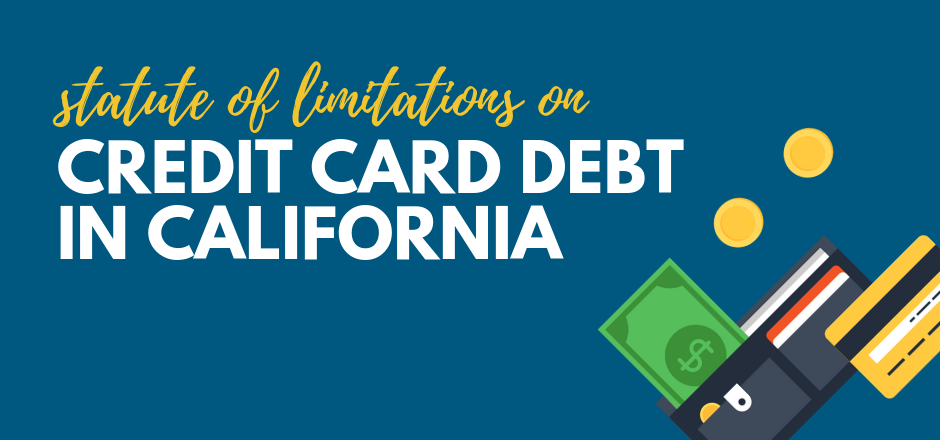Statute of Limitations on Credit Card Debt in California
The average person has around $3,353 in credit card debt. If you’re not careful, one unexpected bill may cause temporary financial hardship and make it difficult to repay your debt on time.
In this article, you will discover the statute of limitations on credit card debt in California and what it means to your financial future.

How Creditors Handle Late Payments
Most creditors understand that life happens. While all credit card companies expect timely payments, they tend to not be very aggressive immediately after the due date is missed. As the days pass, you may begin to receive phone calls and letters reminding you of your missed payment. The majority of creditors do not report your payment as late until the 30-day mark, which means you do have a small window of opportunity to get caught up again.
Creditors become more aggressive once your late balance hits the 30-day mark, though. Now you owe two payments with no sign of an intent to pay. Most are still willing to work with you at this point, but the phone calls will become more frequent and you’ll receive additional notices in the mail.
Related: Filing for Bankruptcy
You will definitely end up with a blemish on your credit report. Most will keep your debt in-house for several months, attempting to contact you to work out a payment arrangement. If your debt is small, it may be worth negotiating a smaller monthly payment.
Every company is different, but at some point your creditor will send your debt to collections. Collections agencies are notoriously more aggressive than the companies they represent. After all, they have a vested interest in collecting payment from you so that they can be paid. They will continue to mail letters, call your home (several times per day), and even call family members in an attempt to “reach you” to discuss a personal matter.
Can I be Sued?
Yes, you can. A lot of credit card companies won’t bother to sue you for small amounts, especially if the money they’ve spent in collections has surpassed the value of your debt. It would simply cost more than it is worth to take you to court and get a judgment. Those who have accumulated a lot of debt on a high-limit card will most certainly, at some point, receive a summons.
Creditors usually take debtors to a district court, or small claims court, to petition for a judgment. You will then need to prove you don’t owe the debt or plead your case to the judge. Not appearing will result in an automatic judgment against you, which then gives your creditor the right to pursue additional collection methods. These may include wage garnishments or liens on your bank accounts.
Statute of Limitations on Credit Card Debt in California
Your credit card company must make the decision to sue you within the statute of limitations, or the legal amount of time the state says they have to work within. In California, there is a four-year statute of limitation if you have a written contract or a two-year statute of limitations if you made an oral contract. Almost all credit card contracts are made in writing, via the application process.
It’s important to understand exactly when a statute of limitations begins. In many cases, it starts on the date the first payment you missed was due. That said, some people continue to make purchases even though they have not made payments; thus extending the start date to the date of the last purchase. Attempting to make smaller payments, even if they don’t meet the minimum due, can also extend the start date to the last payment made.
There is an exception to the rule regarding the last payment made. The statute of limitations applies to the last payment made while the account was still usable. If your credit card company revokes your right to use the account, they can no longer restart the statute of limitations. It is stuck at the date of the last payment you made before your rights were revoked, or the date of the missed payment if no payment is ever made.
There are some things your credit card company may do to extend the start date and further their ability to collect. Let’s say, for example, your due date was March 1st. You miss your payment and the credit card company sends a letter stating they’ve extended your due date to June 1st. This is nice of them, but it pushes your “missed payment date” back by three months, giving them more time to collect.
Conclusion
Once the four-year statute of limitations has expired, your credit can no longer sue you. This doesn’t mean the debt is erased, though. You are still technically legally obligated to pay your debt per your original contract. The credit card company simply loses their right to file a lawsuit against you.
There are some instances in which you may truly believe your credit card debt is incorrect. California law allows you to refuse to pay if you believe there is a billing error, in which case you must send a formal letter to your credit card carrier within 60 days of the date of the bill.
You can also refuse to pay if you have a “claims and defenses” dispute, or a dispute with the merchant or business that charged your card. This only applies to businesses located within 100 miles of your home, and only if you have attempted to resolve the matter with the business itself first.
Defending yourself in a lawsuit over credit card debt can be complicated, especially if you are having trouble proving what you do or don’t owe. However, there are a variety of attorneys available to help.
Are you in search for a certified attorney to represent you?
Let us help you find one today!

